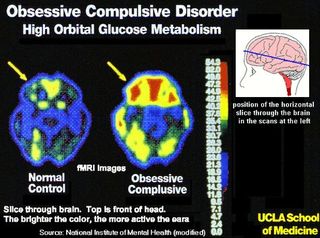OCD
We Are Not All "A Little Bit OCD"
The pandemic presents an opportune time to dispel this myth.
Posted April 10, 2020 Reviewed by Gary Drevitch

Contrary to what you may have heard about Obsessive Compulsive Disorder (OCD), we are all not “a little bit OCD." We are actually not “OCD” at all because OCD is not an adjective. It is a noun that defines a debilitating mental health condition. It is a disorder.
While jokes about OCD and myths about what it means to live with the disorder are pervasive, the global pandemic has fueled further misconceptions. Most notably, OCD has been falsely conceptualized as something that people are rather than a disorder that they live with.
Actress Nina Dobrev, with a reach of 19.3 million people on Instagram, posted a photo of her washing her hands with the caption “If you weren’t OCD about washing your hands before all this [that’s okay], START NOW.” What this translates to in reality is “If you weren’t a mental health disorder before all this [that’s okay], START NOW.” While utilizing OCD incorrectly, Dobrev has actually urged people to morph into a mental health disorder—as if that were possible.
In a similar fashion, psychiatrist Elias Aboujaoude wrote an op-ed article for the Wall Street Journal titled "We All Need OCD Now." Aboujaoude claims that OCD is not something people have but something that public health authorities are ordering us to become. His column perpetuates the myth that OCD is both an adjective and something that is helpful to human beings. As an OCD specialist and sufferer, I can assure you that OCD is not helpful or something that I would wish upon anyone. It is never something that I or my clients need.
The false narrative that Dobrev and Aboujaoude, among many others, are reinforcing is multifaceted, and breaking it apart involves looking at both the content and process of living with OCD.
The first step is understanding that OCD is a diagnosable mental health condition and not a personality quirk or character trait. The OCD sufferer experiences symptoms, including but not limited to obsessions surrounding contamination, but does not become obsessions surrounding contamination. To live with a mental health condition is not to become a mental health condition as to live with a broken bone is not to become a broken bone. We are human beings and not diagnoses.

Now that we’ve established that OCD is not something we are, but something that people have, we can debunk the myth that we are all “a little bit OCD." OCD is a medical brain disorder and studies show that those with OCD have brains that are wired differently than those without. While every human being gets intrusive and unwanted thoughts, the thoughts stick for those with OCD and become obsessions because of the way their brain is wired. Those without OCD can easily brush off the intrusive thoughts whereas those with OCD cannot.
Additionally, OCD has a strong genetic component. One cannot just start having the disorder out of the blue, as Dobrev suggests, or shut it off. Genes and the way a brain is wired contribute heavily to a person's diagnosis.
OCD is also irrational, largely in part to the myriad of false alarms that the OCD brain sends out. The brain’s “filter” is malfunctioning, and thoughts are being flagged as dangerous when danger is not present. While obsessions are based on little to no evidence and are often unrealistic, the sufferer feels like they in danger because of the false alarms. They then engage in compulsions that are either excessive or not connected in a realistic way with the obsessions they are trying to neutralize.
Most of the world’s population is currently washing their hands more than usual and trying not to touch objects or people that might be “contaminated” with COVID-19. While this mirrors symptoms that some—but not all—with OCD experience, washing your hands more frequently in response to a global pandemic does not automatically meet criteria for OCD. It likely means that you are following CDC and WHO guidelines to protect yourself from COVID-19, a true and rational threat to our population.
A recommendation to prevent the spread of a virus is different than a compulsion performed in an attempt to ward off irrational obsessions. Public health authorities are not urging us to perform behaviors that are unrealistic or become a mental health condition. They are, quite simply, urging us to wash our hands more to protect ourselves from viable danger.
Furthermore, living with OCD does not even equate to compulsive hand-washing a lot of the time because OCD is not solely about contamination concerns. The content of obsessions varies widely and includes everything from unwanted sexually intrusive thoughts about children (the fear of being a pedophile) to scrupulous obsessions (the fear of offending God or not praying in the “right” way) to somatic obsessions (hyper-focus on automatic bodily functions like blinking and breathing).
Regardless of the content, OCD is characterized by intrusive and unwanted thoughts, obsessions, that are ego-dystonic: not in alignment with the sufferer’s self-concept. OCD is also characterized by compulsions, either physical or mental, that the sufferer carries out in an attempt to prevent some dreaded outcome from occurring or to neutralize obsessions.
This content of obsessions and the unrelenting process of the OCD brain, firing off false alarms and unwanted intrusive thoughts continuously, is not something that we all live with. OCD is not something that we need, now or ever.
We don’t need to live with terrifying intrusive thoughts and images popping into our mind all day long. We don’t need to fear living in our own mind. We don’t need to live with time-consuming compulsions that don’t help, but rather strengthen the Obsessive-Compulsive cycle and keep people suffering. We don’t need to live with an overactive brain that sets off our internal alarm system when no intruders are present.
OCD is a debilitating, tormenting and cruel disorder. The next time someone trivializes OCD as a personality quirk, please remember the roughly 25% of people living with disorder who have attempted suicide. OCD is not a joke.




